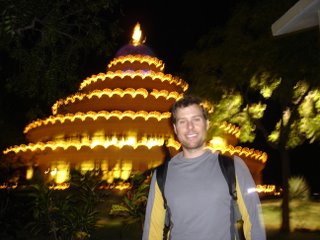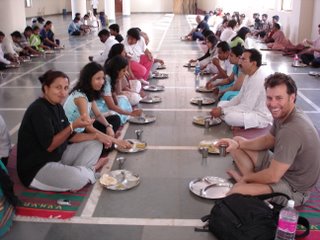The Present

(Above: Main "stuppa" like building where classes were held on the fifth floor.)
“I love you Todd,” Roopa answered the phone with joy in her voice. Arriving at Sri Sri’s ashram in Bangalore, I called Roopa to let her know that I was enrolled in the three day Art of Living Basic Course.. She was thrilled and I thanked her for influencing my journey through India. But that was just a cover up, a way of avoiding the questions I wanted to ask, what was the prognosis for her diagnosis. But how to ask was troubling me, what would she say? What should I say? Divine answers avoiding me, I reluctantly asked as I ventured into an emotional minefield, “What’s the latest?”
“Oh, I have only one wish,” she responded with a calm joyous tone, “that my children do not suffer pain from seeing me go through whatever will be.” There it was again, the spiritual superhero like response. Was it rooted in the Indian karmic beliefs that fate was already determined? Was it denial (or acceptance) because she had battled cancer once before? Or was it the ultimate maternal instinct of unconditional love, more concerned over the effect on her children than her own well being? Or perhaps her non-denominational deep rooted faith in something greater than herself was a source of strength?
As if discussing a business trip, Roopa mentioned by the time I finished the course, she would be recovering from her surgery, which she said was minor, a pre-chemo procedure for a treatment delivery system. How did things change so quickly? Two weeks ago we were driving to see my first ashram and inching through Bombay traffic to listen to a talk from a disciple of Paramahansa Yogananda. Now, Roopa’s days were occupied with doctor visits, a radical diet change and flooding her body with chemicals battling microscopic cells threatening her life.
“I’ll see you at the end of the month,” I pre-empted the impending goodbye, mostly to spin a positive note on a matter seemingly more uncomfortable for me.
“Yes, of course, I look forward to it. Jai Gurudev, bye, bye,” she said before hanging up. I looked at the screen of my phone ensuring the call had ended as I tried to grasp the magnitude of the real life wager at stake for Roopa. Walking on auto pilot toward the dining hall, I reflected on my enrollment in a course stemming from Roopa’s appearance in my life less than a month ago.
Two hours earlier, Marc and I hired car from our hotel in Bangalore for the ashram, 22 kilometers from the city center. Traffic leaving the city was thick and rich with toxic fumes as auto rikshaw and taxi tetris continued in its rhythmic chaos. Fifteen kilometers from the city center, the color of nature began to reappear as green trees and grass took root in the countryscape. Squashed by gross polluting engines propagated by loose government restrictions on emissions, oxygen reclaimed the atmosphere to our lungs delight.
Throughout the drive, I pondered what lay ahead in the upcoming days. Would I like the ashram? Would it change my life? Did I want a life change? What did I drag Marc into? I was happy to have him along whether he liked it or not as it seemed to be one of those times when things could go really well and I could grow in some meaningful way, or I could end up running from a pack of silent monks with razors trying to give me a thin curly pony tail and wrap me in orange sheets for a makeshift robe.
Our car made a turn off the main road into a gated entry where an unarmed guard took down some information from our driver. Eyes wide open, silence fell in the car as if we had entered a library. Marc stared out the left side of the car, while I scoped out the right. This was new territory shrouded in mystery mostly due to our own lack of understanding, research and inquiry.
Rolling to a stop on a reddish brown dirt road in front of a white marble porched building, the sign read, “Welcome Home”. Um, excuse me, but home is Northern California, my pillow top mattress is nowhere to be found and the nearest Whole Foods is ten thousand miles away – 9,990 miles out of my salad bar raid range. Surely the sign was mistaken. Appreciative of the sentiment, we kicked off our shoes and approached the “Reception”. We were politely referred to the other “Reception” for international guests upstairs so we put on our shoes, walked around the building, removed our shoes and assumed seats before two men working behind a desk in a room with fan circulating the air overhead.
“We’d like to enroll in the Basic Course,” I said, halfway expecting to be told that the class was canceled or full. While I had phoned the ashram on two separate occasions, both times I had casually been told to show up for class before 9 a.m. on Friday. No one had asked for my name or credit card to secure our space in the class so the thought that this journey could come to an abrupt stop crossed my mind. And returning for the next class session was likely not to be an option for me, and certainly not for Marc.
Applications were pulled from a drawer, placed in front of us, and standard operating questioning in India ensued. “What is your name?”, “Where are you from?,” “How long are you traveling in India?,” “What do you think of India?”. By now, we had the trite, to the point answers prepared for quickly dispensing with the now familiar cultural formalities, “Todd and Marc, California, 5 weeks, beautiful country.” It was not intended to be short, but it was all that the inquiring minds really wanted to know. Having visited four states in India thus far, I realized it was less to strike up an extended conversation and more just the plain curiosity of the Indian mind.
Applications completed in block letters, combination to the padlock on our room door in hand and a 6,600 per person rupee “donation” later, we were on our way to Room No. 10 in the three story Riddhi dorm building. The ashram spread across some 60 acres, including a man made lake, several dormitory buildings, a dining hall suitable for seating thousands on the floor, an outdoor grass amphitheatre stepped with red brick, several administrative buildings, a canteen (place for light snacks and water for purchase) and the main center for spiritual gathering, a six story circular stuppa shaped building, wider at the base and successively narrower each of the six stories to the top. The lower floor was an indoor marble amphitheatre with a stage, while the other levels were simple rooms with no furniture, just throw pillows for meditation, classes and yoga.
Three times to the right, 12, twice to the left, 26, once to the right, 4, and we cracked the padlock to our room. Basic, but clean, we made our beds with the sheets provided on our single patio chair-like pad on a dark wooden platform. Fan swirling overhead, we quickly placed our valuables in our small daypacks and headed for dinner, as we were now on ashram time, which meant dinner was served from 6:30 to 7:15.
It was on the way to the dining hall that I phoned Roopa to share the news of my enrollment in the residential basic course at the ashram. I wanted to be sure she knew that she had a made an impact on my life. Knowing that she was in a fight for her life made communicating my sentiments more urgent as each moment becomes more precious when limits are proposed exposing one of the many ironies of the human mind. That which distinguishes us from our nearest primate relatives, our ability to plan for the future often leaves us in constant pursuit of the next “thing” whatever that may be, while each moment in the here and now is traded for some non-guaranteed time in the future.
Serenity filled the ashram air waves as crickets and birds provided a natural background for introspection. Maybe it was because of the noisy center of Bangalore or the more stop than go drive to the ashram, or a collective focus on meditation, but peacefulness forced its way into my mind. Arriving at the dining hall, two lines of fifty people stretched stainless steel tables supporting three large stainless pots with the ever present white rice and two mildly flavored dishes of the evening. A food critic's nightmare, the food was bland, salted more heavily than to my liking, served on a stainless plate with no utensils, but satisfying to the call of hunger.

Once to the front of the line, volunteers manipulated large stainless spoons scooping and shoveling food onto diner's plates. Seated "Indian" style rows of hundreds of ashramites, a few westerners, and anyone who was hungry from the local community, used their god given utensils (right hands) mashing rice with the other dishes. Washing your hands before dinner took on a whole new level of importance as I could once again hear my Grandmother's request to wash up before dining.

(Yum Yum!, Marc's hand prepares to dive in!)
Class would start the following day so Marc and I retired to our room as the highlight of ashram nightlife, evening satsang (visualize campfire sing along minus the campfire) conclude. The finale on the first eve was a cold bucket shower to cool the skin from the day's dry heat. As I tried to settle down for sleep, excitement, curiosity and wonderment kept my mind from the REM called for by the body. My final thoughts centered around a prayer for Roopa and acknowledgement of her hand in my current life curriculum. Over the next few days, lessons of wisdom from the ages would be offered through the course, but a real life "art of living" was being modeled by Roopa.
To be continued . . .


<< Home